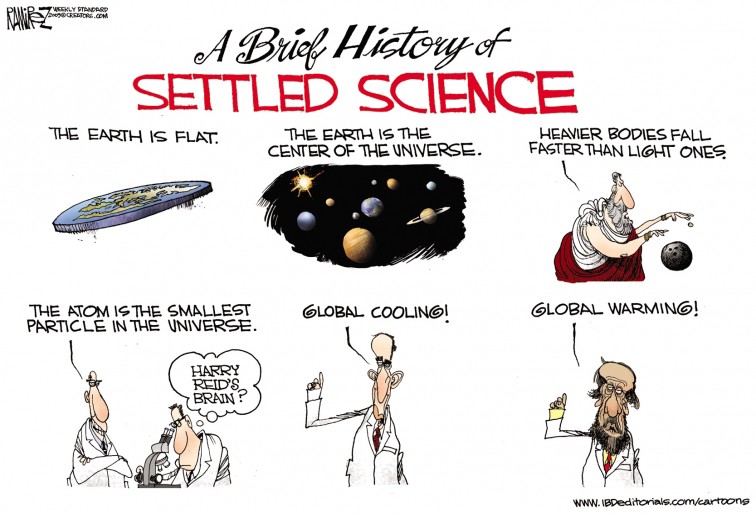The Climate Change Case Against Carbon DioxideBy Bob Webster July 24, 2017
Yet it is estimated that only 2% of the US population has earned a degree in one of the sciences or in engineering. It should be no surprise, then, that when the discussion turns to science, people often wince and tune out. However, that doesn't mean only scientists are capable of discussing and understanding science intelligently and meaningfully. A scientific issue that is the topic of conversation by far more people than those who have a sufficient scientific background to critically scrutinize the veracity of its claims is the issue of human-caused-climate-change. Specifically, that issue derives entirely from the premise that increased atmospheric carbon dioxide (CO2) will dramatically warm Earth's climate. The challenge, then, is to either validate or reject the premise that increases in atmospheric CO2 are a sufficient cause of significant climate warming. Traditional science has always been a blend of empirical science stretching our bounds of scientific knowledge coupled with inductive theoretical science that uses empirical evidence as one aspect of validating theories. The process underlying validation of all theoretical scientific propositions is known as The Scientific Method. Every scientific theory can be reduced to an if, then construction. In the example of human-caused-climate-change theory, the theory can be stated as if human use of fossil fuels increases atmospheric CO2, then Earth's climate will warm significantly. Unfortunately, the implications of the theory do not work in reverse (the mere fact of a warming climate does not prove such warming is the result of human activity's impact on rising atmospheric CO2). Nevertheless, such claims are made and offered as "proof" of the theory! Despite the complexity of climate change science, it doesn't require a scientific degree to grasp the essence of the theory. It might come as a surprise to learn that it also doesn't require a scientific degree to scrutinize and judge the validity of this particular theory. Let me explain. The Scientific Method, Theory and Law The Scientific Method is a process by which a theory is painstakingly scrutinized in order to either validate its conclusion or reject it as flawed. The Scientific Method follows these steps to scrutinize and then either accept, revise, or reject a theory:
If the theory passes extensive scientific critique of its underlying basis; and exhaustive experimentation universally confirms the "if, then" construction; and extensive observation in nature universally confirms the "if, then" construction, then, and only then, is the theory accepted as having survived The Scientific Method. Note that a single failure of the theory (e.g., observation of nature contrary to the theory) is sufficient to doom any theory. Passing scrutiny of The Scientific Method does not confirm the status of "scientific law" on a theory; it only certifies that, to date, rejection of the theory cannot be supported using The Scientific Method. Having survived scrutiny by The Scientific Method, the theory is accorded general acceptance. This does not mean the theory cannot be challenged nor scrutinized in light of new evidence. Indeed, continued skeptical scrutiny is always encouraged in science. Absolute truth exists in science. Such truths are known as scientific laws. Over time, Newton's theory of gravity derived by his inductive reasoning has been empirically confirmed to the extent that it is now accorded the status of a law of physics. Summarizing The Scientific Method, it is a means by which every theory is critically and exhaustively examined to either reject, modify, or accept the theory as valid. What About Human-Caused-Climate-Change Theory? The human-caused-climate-change theory, also known as the greenhouse-gas-theory-of-climate-change, also incorrectly called "climate change" and "global warming" is the proposition that additional CO2 gas emitted by human activity burning fossil fuels to provide energy for a modern civilization will lead to "unprecedented" and "catastrophic" climate change that will dramatically increase global temperatures with dire consequences to all life on Earth. We frequently hear the following:
Yet, the underlying theory has never been scrutinized using The Scientific Method! Why do you suppose that is? A scientific theory cannot be validated either by consensus or appeals to authority. The only valid process is a proper scrutiny using The Scientific Method. A theory that has never undergone proper scientific scrutiny cannot be considered "settled science". Constant scrutiny and skepticism are required for every rigorously examined scientific theory. A scientific theory is never "settled" so "the debate" is never "over". Only scientific laws are considered "settled science". Ask yourself, why am I being told an untested theory is "settled science" and "the debate is over" when it comes to human-caused-climate-change? Does Nature Contradict the Human-Caused-Climate-Change Theory? It isn't necessary to exhaustively examine each facet of this theory with complex scientific processes in order to reject it. Remember, all it takes to reject any theory i the discovery of a single counter-example in nature. That is, an example where the "if, then" construction fails in nature.
| ||||
Bob Webster is a descendant of Daniel Webster's father and early American patriot, Ebenezer Webster, with a strong interest in history, our Constitution, U.S. politics and law. With objectivist and libertarian roots, he has faith in the ultimate triumph of truth and reason over deception and emotion and is a strong believer in our Constitution as written. A lifelong interest in meteorology and climatology spurred his strong interest in science; he earned a degree in Mathematics at Virginia Tech in 1964. Read more by Bob at http://webcommentary.com/index.php Visit Bob Webster's website at www.webcommentary.com
|

